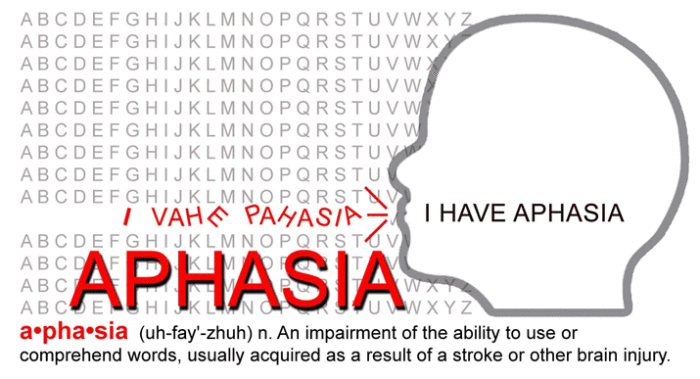Aphasia is a communication disorder resulting from damage to the parts of the brain that contain language (typically in the left half of the brain.) Aphasia may cause difficulties in speaking, listening, reading, and writing, but does not affect intelligence. There are many different types of aphasia such as global, Broca’s, Wernicke’s, primary progressive, anomic, and mixed non-fluent aphasia.
I fractured my skull in two places, the left temporal lobe and at the base of my skull. I have anomic aphasia (also known as dysnomia, nominal aphasia, and amnesic aphasia). It is a mild, fluent type of aphasia where an individual has word retrieval failures and cannot express the words they want to say (particularly nouns and verbs.)
I can’t remember words, but it’s not just once in a while like when you have a word on the tip of your tongue and you just can’t get it out – for me it is constant. It makes it really hard for me to have a conversation with people. When I know I am going to be in a social situation, I get anxious, which makes my aphasia even worse. Add to that my inability to read people’s emotions, plus my lack of self-control and self-awareness when it comes to saying inappropriate things, and I often feel like a talking disaster. I have seriously thought of making cards – like business cards – to hand to people when I first meet them with information about aphasia. Then maybe they won’t think I’m high or weird.
When I explain aphasia, I usually get the same response, “Oh, I get that all the time too, it’s called old age.” I want you to know it is not the same. Maybe it’s just me, but I would rather someone say, “Wow, that must suck,” than “Oh, that’s no big deal, I have that too.” Dismissing it as something less than what it really is makes it even more frustrating for me.
I also prefer to write rather than speak, which is why I choose to communicate via text or email more than talking on the phone. For some reason, speaking on the phone is harder for me than speaking to someone in person. I just can’t concentrate; my mind wanders. I can’t speak on the phone while I am doing something like cooking dinner. Often, my husband will call me on his way home from work and ask me about my day, or want to know how school was for the kids. I have to tell him I am cooking dinner and can’t talk. We have been married for 15 years now, and I still sometimes worry he doesn’t understand, or thinks I am not interested in speaking with him, or angry — which is far from the truth. I want people to know they shouldn’t take it personally if I don’t call them. Really, it’s not you, it’s me.
Writing is somewhat easier for me, because if I don’t know the word I am trying to remember, I can just stop and take a break, or Google “What’s the word for …….” Believe it or not, Google usually comes through for me. But that doesn’t mean I don’t have difficulty writing. Most of the time, what I write doesn’t make any sense, so I get angry and frustrated and that makes it worse. I just have to stop and walk away from what I am trying to write until the circuits in my brain start working properly again. That means my responses to emails and texts are not always timely. It’s not because I am ignoring you. It’s because my brain injury makes me feel like a hostage with my mouth covered with duct tape and my hands tied behind my back.
I feel controlled by my brain injury. No matter how much I fight it and try not to let it control me, I always lose. So, I have stopped fighting it, and now I am trying to work with it. I’m trying to find some harmony, but it isn’t easy. Just as I need others to be patient with me, I need to be patient with myself as well. It is just the reality of life with a traumatic brain injury. It’s not a sprint, it’s a marathon.
We want to hear your story. Become a Mighty contributor here.


